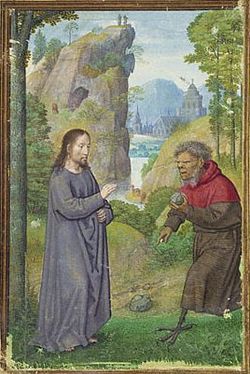- Matthew 4:3
-
 16th century master illuminator Simon Bening's depiction of the devil approaching Jesus with a stone to be turned into bread
16th century master illuminator Simon Bening's depiction of the devil approaching Jesus with a stone to be turned into bread
Matthew 4:3 is the third verse of the fourth chapter of the Gospel of Matthew in the New Testament. This verse opens the section in Matthew dealing with the temptation of Christ by Satan. Jesus has been fasting for forty days and forty nights and in this verse the devil gives Christ his first temptation and encourages him to use his powers to get food.
In the King James Version of the Bible the text reads:
- And when the tempter came to him,
- he said, If thou be the Son of God,
- command that these stones be made bread.
The World English Bible translates the passage as:
- The tempter came and said to him,
- "If you are the Son of God, command
- that these stones become bread."[1]
This verse is very similar to Luke 4:3, but it is not found in Mark. Mark mentions that Jesus was "put to the test" but goes into no details about what those tests were. It is thus generally believed to have come from the Q document. One change is that Luke has "this stone" while Matthew has stones. Albright and Mann ascribe this to the writing style of the author of Matthew, noting that this gospel has a tendency to pluralize words that are singular in the other synoptics.[2] Gundry notes that Jesus, as one person, would not need multiple loaves. He argues the pluralization is to link the verse to Matthew 3:9 in an attempt to link Satan to the Pharisees and Sadducees. Another difference is that Matthew calls Satan "the tempter" while Luke more directly refers to him as "the devil." Gundry feels this is for the same purpose as in Matthew 16:1, 19:3, and 22:18 the Pharisees and Sadducees are similarly presented as tempters.[3]
Most scholars agree that the word if does not mean that Satan is doubting Jesus' status and the line should be read as "since you are the Son of God" not as "if you are really the Son of God." Gundry states that the devil has no interest in making Jesus doubt his sonship, and rather tries to use the exalted position to undermine him. This line is a direct reference to Matthew 3:17 and it is clear that Matthew is implying that Satan heard the announcement made after Jesus' baptism.[4]
The wording is unclear on whether Satan is asking Jesus to miraculously transform the stones himself, or if he is asking Jesus to command God to do so.[5]
The standard loaf of bread in this period was a round, flat loaf, and it seems likely that the stones being referred to in this verse are of a similar size and shape.[6]
This is the second mention in Matthew of stones being transformed, with stones to people being threatened in Matthew 3:9. Nolland believes that this earlier reminder of God's power served to make this verse more plausible.[7]
References
- ^ BibRef Matthew 4:3
- ^ Albright, W.F. and C.S. Mann. "Matthew." The Anchor Bible Series. New York: Doubleday & Company, 1971.
- ^ Gundry, Robert H. Matthew a Commentary on his Literary and Theological Art. Grand Rapids: William B. Eerdmans Publishing Company, 1982.
- ^ Gundry, Robert H. Matthew a Commentary on his Literary and Theological Art. Grand Rapids: William B. Eerdmans Publishing Company, 1982.
- ^ Nolland, John. The Gospel of Matthew: a commentary on the Greek text. Wm. B. Eerdmans Publishing, 2005 pg. 164
- ^ France, R.T.. The Gospel of Matthew. Wm. B. Eerdmans Publishing, 2007 pg. 130
- ^ Nolland, John. The Gospel of Matthew: a commentary on the Greek text. Wm. B. Eerdmans Publishing, 2005 pg. 164
Gospel of Matthew Preceded by:
Matthew 4:2Chapter 4 Followed by:
Matthew 4:4Categories:- Gospel of Matthew verses
- Satan
Wikimedia Foundation. 2010.
